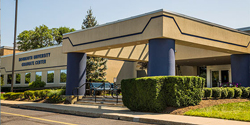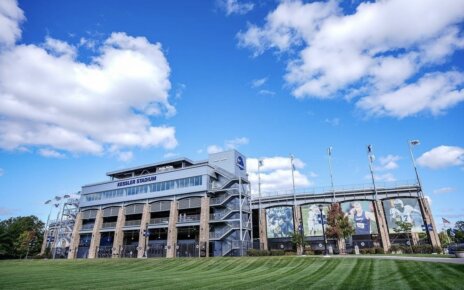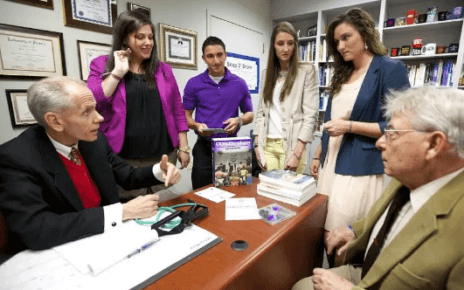While both undergraduate and graduate students alike are involved on the University’s campus, some graduate students have the opportunity to attend classes at the Monmouth University Graduate Center, located about two miles from the main campus, and has its own community of graduate students, offers four major programs of study, and is still in the process of growing.
The Graduate Center is home to Physician Assistant (PA), Speech-Language Pathology (SLP), Clinical Mental Health Counseling, and Addiction Studies programs. The Center features outfitted dedicated classrooms, clinical skills laboratories, observation rooms, and equipment to support each of these programs in the ways needed.
Michael Palladino, Ph.D., Associate Vice Provost of Graduate Studies, offered that the idea for the Graduate Center stemmed from the realization that space on the main campus had become limited, and the University felt that graduate students needed a place they could go to properly be able to pursue their education at a facility that suited them.
“We are really trying to grow graduate education at Monmouth and create more graduate programs that will enhance the University as well as provide more options for our students. We are restricted to the amount of undergraduates we can have on campus, but with graduate studies, we can really build and part of the plan for graduate education is the graduate center,” Palladino said.
“We want more space for graduate students and we’re committed to creating an environment where graduate students can study apart from undergraduate students.”
Palladino also offered that additional space given to graduate students frees up more space on the main campus for undergraduate students.
In addition to this idea, Palladino said that the development and improvement of the Graduate Center is still on-going, and that more programming and additional classrooms and laboratories will be added within the next few years.
The facility, which used to be the Monmouth Park Corporate Center, now utilizes about 30,000 square feet, and the University hopes to expand as soon as possible. The facility is home to programs that are primarily within the health field, and additional programs that may be added and hosted by the facility will also be in that field for consistency.
“We look for three really important things when choosing potential graduate programs, which include student demand, market demand from employers, and faculty expertise,” Palladino said. “We’re looking to add an Athletic Training Program as well as an Occupational Therapy Program and house it at the Center, so that is really exciting.” Palladino also mentioned a partnership with Monmouth Medical to create a nursing simulation lab with state-of-the-art technology, however, the date of completion for the project has not yet been determined.
Aside from the educational aspect of the Center, Palladino suggested that it is really important that the building has the same campus environment as the main campus. As of now, the building has a small seating area and café, but in the next year he hopes that will be expanded. “We’d love to add more student lounge space and even perhaps a dining hall-like area with better options then what there is now,” he said.
Dana Porowsky, a graduate student pursuing an MS in Clinical Mental Health Counseling remarked that the facility is really intimate and comfortable. “I really enjoy it. Everyone knows each other and everything you need is in one place,” she said.
Mallory Sheklian, a graduate student also pursuing an MS in Clinical Mental Health Counseling, said that aside from the obvious educational benefit, it is really important to have comfort. “I really like the mini-mart. They have great sandwiches and I also like that there are a lot of bathrooms and places to sit.”
Another facet of the Graduate Center is the Center for Speech & Language Disorders, which provides evaluation and treatment rehabilitation services to the neighboring community, according to the University webpage.
Therapy is provided throughout the semester by a Monmouth University graduate clinician under the direct supervision of a Speech-Language Pathologist with certification by NJ and the American Speech and Hearing Association (ASHA).
Patricia Remshifski, Ph.D., CCC-SLP, Director of the Speech Language Pathology Program and assistant professor of Speech Language Pathology, explained that the Center has been seeing clients in the community who have communication disorders (speech, language, cognitive communication disorders) since February of 2015.
Graduate students have the opportunity to treat a wide variety of areas including augmentative communication, accent modifications, aphasia, apraxia, articulation disorders, auditory processing disorders, autism, cognition, dementia, language disorders, neurological impairment, phonological disorders, stroke, stuttering, voice, and others.
“The graduate students work one on one with the clients and the graduate students are supervised by licensed and credentialed speech-language pathologists. This Center for Speech and Language Disorders has nine treatment rooms with three specialty labs for research. Each of our nine treatment rooms has an observation room for families,” Remshifski said.
“We also have a state of the art video system so that students can tape their sessions and reflect on the treatment they have provided. Graduate students have the opportunity to provide direct treatment as well as participate in research.”
Stephanie Parada a graduate speech language patholgy student who works at the clinic, said,” As a first year graduate student (third semester), we each have individual clients we see on a biweekly basis alongside a faculty supervisor.”
She continued, “Individual client sessions allow the opportunity to write lesson plans, treatment plans and soap notes and help prepare us for externship and our work as future clinicians. In addition to seeing individual clients, we see clients in a group setting once a week along with taking three classes this semester.
The additional programs located at the facility also have some developments that department chairs as well as students are excited about.
The Clinical Mental Health Counseling Graduate Program is the first mental health counseling program in the state to be accredited by CACREP. The Master of Arts in Addiction Studies was designed to combat the national addiction epidemic and provide a route to become a Licensed Alcohol & Drug Counselor (LCADC). The 33 credit program fulfills the educational requirements for the LCADC license in New Jersey, and is both INCASE and NASAC accredited.
“All of our classes take place within the Department of Professional Counseling which also offers a 60 degree MS program in Clinical Mental Health Counseling, said Alan Cavaiola Ph.D., Director of the Addiction Studies program. “The main advantage of being off-campus is that our facilities were designed specifically for our program. Not only do we have state-of-art classrooms but we also have group rooms, observation rooms with one-way mirrors, conference rooms and students have ready-access to our own computer lab. What our students like best perhaps is that there is plenty of parking,” he continued.
Cavaiola mentioned that the future for the department looks bright. “I don’t have any news any new programs within the Department of Professional Counseling, however, we have proposed adding a mental health and addiction counseling clinic so that our students can see clients right at our facility and receive case supervision. We feel that this would be a benefit to our students and to the local community,” he said.
“With regards to addiction studies, I’m sure that just about everyone is aware of the opioid crisis that has gripped New Jersey and many other States throughout the U.S. There is an ever-growing need for addiction counselors to work in inpatient, outpatient and intensive outpatient programs not only with people impacted by Substance Use Disorders but with family members and significant others who are also impacted.”
“Having Graduate programs at the Graduate Center is a great idea in that it provides our programs with a unique and separate identity which graduate programs deserve. The only down side is that many of our undergraduates don’t know our programs exists and that Clinical Mental Health Counseling and Addiction Counseling are viable career paths for those who want to provide counseling services and don’t necessarily want to go on to doctoral programs right away. I’m hopeful that graduate programs will continue to be added at Monmouth University and the Graduate Center provides an excellent opportunity for graduate program expansion.”
The Physician’s Assistant (PA) graduate program is a combination of didactic classroom instruction as well as immersion in a clinical setting, according to the University webpage. When asked about the program and any future programming, Carol Biscardi, Ph.D.PA-C declined to comment and directed The Outlook to Michael Palladino, Ph.D.
The Monmouth University Graduate Center is still in the process of evolving, and Graduate Studies at the University are also in the process of expanding over the next few years.
Danielle Wolfe, a graduate student pursuing a M.S.Ed in Student Affairs and College Counseling said, “Having our own space as graduate students is something unique. It’s really nice to have spaces set aside just for graduate students to enjoy and learn in. It makes you feel special.”
IMAGE TAKEN from Monmouth Unviersity webpage




